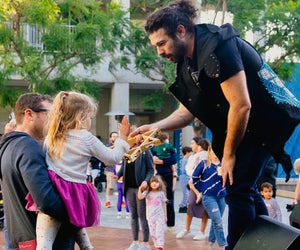Ask an Expert: How Can Parents Help Kids Cope with the COVID-19 Outbreak?

If the COVID-19 outbreak is keeping you up at night, you're probably wondering how your kids are coping. Well, according to pediatric specialists at Connecticut Children's, ranked one of the best children’s hospitals in the nation by U.S. News & World Report, the stress of this pandemic could have a negative impact on a child’s development. The good news: it doesn't have to.
"We all deal with regular stresses on a daily basis," Connecticut Children’s developmental pediatrician Robert D. Keder, MD told us. "A little bit is a good thing; it motivates us to study for a test or run a little faster in a game. Some stresses are stronger, but still bearable when we have positive protective relationships. What’s happening with COVID-19 right now falls into what developmental specialists call 'toxic stress.'"
By itself, toxic stress can negatively impact children's development—leading to challenges in behavioral and physical health—but, fortunately, this kind of stress can also be buffered by building resilience. Read on to find out how pediatricians at the only health system in Connecticut dedicated exclusively to the care of children recommend you help kids build that resilience and cope with the unprecedented Coronavirus pandemic.
Provide kids with plenty of support and open communication
“Fight the temptation to tell your kids how they should be feeling right now. Instead, tune into your children’s emotions," says Bradley S. Jerson, PhD, a pediatric psychologist at Connecticut Children’s. He suggests inviting kids to talk about their feelings, and keeping an eye on behavior in younger kids or those who might have harder time articulating their emotions. "Use your parenting superpowers to tune into changes in their behaviors, ways they interact with you or other siblings, or other personality changes."
Dr. Jerson also encourages parents to "allow yourself to truly understand what tangible effect this is having on your kids’ lives.” A cancelled birthday party or the possibility of missing senior prom may seem a bit trivial to us adults in the midst of a global health crisis, but acknowledging your child's disappointment will really go a long way.
Structure learning to enable children to build a sense of self-efficacy and control
While schools are closed—possibly for the remainder of the academic year—it's important to support your child’s language and academic development. As Connecticut Children's education specialist Ann Koenig puts it, "Children of all ages need to understand that this extended break isn’t a series of snow days, but an important time to continue learning."
“For really young kids, especially age 2 and under, even age 5 and under, the best form of learning takes place with parent or adult and child one-on-one," adds Dr. Keder. "Taking 20-minute breaks throughout the day to play or read a book is a nice way to build their skills. If you can build a schedule, that also helps their social and emotional development. By keeping things regular and predictable, you are helping them develop the ability to be resilient!” Regular wake-up times, bedtimes, and meal times can further enforce those routines.
Help kids strengthen their adaptive skills—like self-care and self-direction
Speaking of learning, this time at home is a really meaningful opportunity to focus on practical life skills that are sometimes left out of a typical academic curriculum. From using good manners to maintaining eye contact when speaking with someone to resolving conflicts, home is a good setting to help children learn or expand on their adaptive functioning. While you aren't rushing to catch the school bus, teach your preschooler to zip a zipper, or when making a donation to a local food bank, show your teen how to write a check.
"Remember that not all learning involves traditional school subjects," suggests Ms. Koenig. "Have your child help you with a project around the house, such as fixing a leaky faucet, washing dishes, or folding laundry."
Take care of your children by taking care of yourself
“We can help care for our kids throughout this by caring for ourselves and keeping ourselves in check too," says Dr. Keder. "Find ways to take time for yourself. If you’re a two-parent household, set up a routine where you switch off and can get a break. If there’s a teenager you trust, invite them to help with some of the responsibilities.” And if you can't call in backup, it's OK to say "You know what? Mommy’s feeling a little stressed right now, so let’s all take five minutes to chill out."
“Any time it feels like there’s a lot of stress, and it’s affecting your child, you, or your relationship, that’s a good time to talk to us," he added, with a nod to the developmental pediatricians, pediatric psychologists, and other behavioral health professionals at Connecticut Children's. "We’re going through difficult times right now. It’s only human to need some support.”
Connecticut Children’s provides more than 30 pediatric specialties along with community-based programs to uniquely care for the physical, social and emotional needs of children—and most of those specialties are now available via Video Visits. Visit connecticutchildrens.org/virtualhealth for details. The Help Me Grow National Center, a program of Connecticut Children’s Office for Community Child Health, also provides a lot of great resources to support healthy childhood development at helpmegrownational.org.
Photo provided by Connecticut Children's
Places featured in this article:
Connecticut Children's
Connecticut Children's Specialty Care Center - Shelton
Connecticut Children's Specialty Care Center - Danbury
Connecticut Children's Specialty Care Center - Fairfield


































